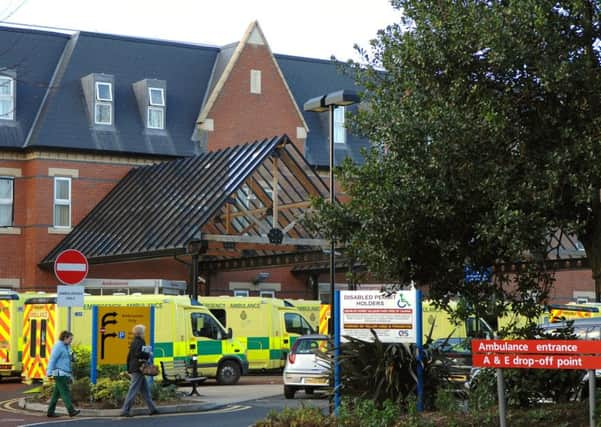Infirmary saves £1.7m a year by cutting '˜premium' overtime


Wrightington, Wigan And Leigh NHS Foundation Trust (WWL) does not pay consultants a higher-than-normal rate for extra shifts.
That is in contrast to the millions of pounds being spent by other hospitals elsewhere in the country paying consultants.
Advertisement
Hide AdAdvertisement
Hide AdAn investigation by the BBC found payments elsewhere had risen by more than a third in the past two years, from £125m to £168m.
But WWL stopped paying the premium rates in 2011 and the decision has saved the taxpayer £1.7m a year.
The changes were made following the financial crisis in 2008.
Chief executive Andrew Foster said: “We immediately realised the NHS was going to enter a period where money was tight.
Advertisement
Hide AdAdvertisement
Hide Ad“The budget was set for a few years, but we knew we had to look at what we were spending and how money could be saved so we could be in a good position when the squeeze on funding started.
“We took the decision that waiting list initiative payments would end.
“I don’t think it is very defensible to pay a huge premium to one group of staff and not to other groups of staff.
“No other member of staff gets triple pay for doing extra shifts.”
Advertisement
Hide AdAdvertisement
Hide AdConsultants do still work overtime, but WWL pays a flat rate rather than the higher premium rates.
They worked to find different ways of cutting costs when the changes were first introduced.
Consultants in urology agreed to do extra shifts of fours hours for plain time, while radiology moved to a pay-per-case basis.
Nurses have taken on some of the tasks done by consultants in endoscopy and ophthalmology.
Advertisement
Hide AdAdvertisement
Hide AdMr Foster said: “We were helped that we had a really good working relationship with our consultants.
“They understood why we were doing this and that is why we have been able to push through these changes when others haven’t.
“I am not saying that it was straightforward in all cases.
“We did have to pay for some work to be done privately to start with in some specialities - and that meant a financial hit to start with - but we knew we could not pay any more of these payments as it would not have been fair on those areas that had agreed to the changes.
“That has now stopped and we have managed to make savings.”
Using the Freedom Of Information Act, the BBC discovered that some hospitals pay up to £1,000 for four hours’ work, while rates of £600 a shift is common - three or four times consultants’ normal rate of pay.
Advertisement
Hide AdAdvertisement
Hide AdThe average amount paid in high-cost overtime last year was £13,356 per consultant.
One doctor at Lancashire Teaching Hospitals NHS Foundation Trust, which runs Royal Preston Hospital and Chorley And South Ribble Hospital, made £375,000 on top of their salary from the shifts.
Figures from 114 of the 186 trusts and health boards showed the amount hospitals spend on high-cost overtime was increasing.
The British Medical Association (BMA) said the payments were a sign of doctor shortages.
Advertisement
Hide AdAdvertisement
Hide AdKeith Brent, BMA consultants’ leader, said: “These payments are made because there simply are not enough doctors and hospitals are under pressure to meet waiting time targets.”
The Department of Health said the NHS would have more than 11,000 more doctors by 2020.
A spokesman said: “Consultants do a vital job and should be properly rewarded, but this analysis shows why we are working with the BMA to replace a unique evening and weekend ‘opt-out’ in the existing contract.
“This will allow us all to promise patients urgent and emergency care of a consistently high standard across the week, and - as the hospitals themselves say - make better use of operating theatres while reducing big overtime bills.”
Advertisement
Hide AdAdvertisement
Hide AdDanny Mortimer, chief executive of NHS Employers, told BBC Radio Four’s Today programme that the situation was not solely due to shortages, and a more consistent approach to payments was needed.
He said: “We don’t believe that in every circumstance these extra payments are generated by shortages. We do face challenges in some parts of the country.
“What we need is a system that can be applied fairly across all doctors. We want to move to a situation where there is a standardised base line nationally for all doctors.”